初中英语知识点归纳汇总【中考必备】
2023年中考英语总复习英语精华知识点全汇总建议收藏
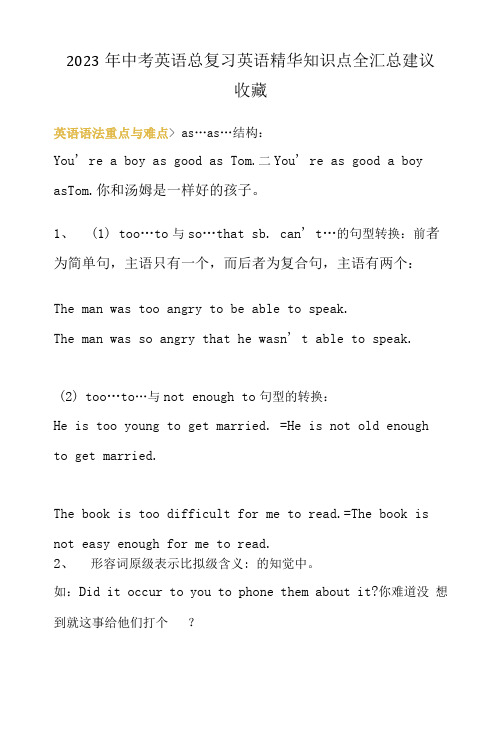
2023年中考英语总复习英语精华知识点全汇总建议收藏英语语法重点与难点> as…as…结构:You' re a boy as good as Tom.二You' re as good a boy asTom.你和汤姆是一样好的孩子。
1、(1) too…to与so…that sb. can' t…的句型转换:前者为简单句,主语只有一个,而后者为复合句,主语有两个:The man was too angry to be able to speak.The man was so angry that he wasn' t able to speak.(2)too…to…与not enough to句型的转换:He is too young to get married. =He is not old enough to get married.The book is too difficult for me to read.=The book isnot easy enough for me to read.2、形容词原级表示比拟级含义: 的知觉中。
如:Did it occur to you to phone them about it?你难道没想到就这事给他们打个?事件作主语时,happen和occur可以通用?如:The accident happened/occurred yesterday. 事故是昨天发生的。
take place指事件发生,但常用来表示“举行”的意思,带有非偶然性?如:The meeting took place last night.会议昨晚举行。
14.in front of, in the front of in front of的意思是“在前面”。
如:There is a tree in front of the house.房子前面有一棵树。
【中考复习资料】初中英语复习知识点汇总
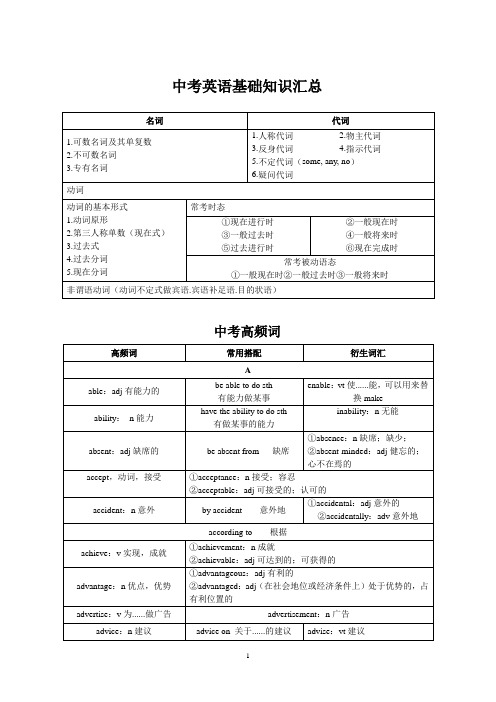
②Knock sb∕sth into a cocked hat
远远胜过某人(或事物);大大超过;是相形见绌
L
lead:引导;指引;领导;名词,铅
lead to导致;通向
leader:n领袖
leadership:n领导力
leave:vi离开
leave for去往,使某人或某物处于某种状态
date:vt约会;n日期
date sb,约会某人
depen:vi依靠,依赖
depend on依赖,取决于
①dependent:adj依靠的,依赖的②dependence:n依赖,依存,瘾,相关(性),依存(关系)③independent:adj独立的
describe:vt描述
①description:n描述
C
calendar:n日历
cancel:vt取消
capital:n首都,资本,大写字母;adj死刑的,大写的,极好的
comfortable:adj舒服的
be comfortable with自在的
①uncomfortable:adj不舒服的②comfort:n舒服;vt安慰
culture:n文化
cultural:adj文化的
⑤过去进行时
②一般现在时
④一般将来时
⑥现在完成时
常考被动语态
①一般现在时②一般过去时③一般将来时
非谓语动词(动词不定式做宾语.宾语补足语.目的状语)
中考高频词
高频词
常用搭配
衍生词汇
A
able:adj有能力的
be able to do sth
有能力做某事
enable:vt使......能,可以用来替换make
初中英语中考知识点总结归纳完整版
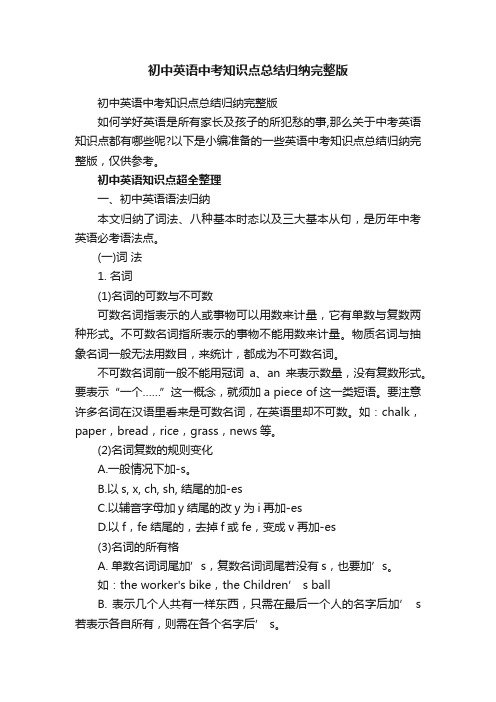
初中英语中考知识点总结归纳完整版初中英语中考知识点总结归纳完整版如何学好英语是所有家长及孩子的所犯愁的事,那么关于中考英语知识点都有哪些呢?以下是小编准备的一些英语中考知识点总结归纳完整版,仅供参考。
初中英语知识点超全整理一、初中英语语法归纳本文归纳了词法、八种基本时态以及三大基本从句,是历年中考英语必考语法点。
(一)词法1. 名词(1)名词的可数与不可数可数名词指表示的人或事物可以用数来计量,它有单数与复数两种形式。
不可数名词指所表示的事物不能用数来计量。
物质名词与抽象名词一般无法用数目,来统计,都成为不可数名词。
不可数名词前一般不能用冠词a、an来表示数量,没有复数形式。
要表示“一个……”这一概念,就须加a piece of这一类短语。
要注意许多名词在汉语里看来是可数名词,在英语里却不可数。
如:chalk,paper,bread,rice,grass,news等。
(2)名词复数的规则变化A.一般情况下加-s。
B.以s, x, ch, sh, 结尾的加-esC.以辅音字母加y结尾的改y为i再加-esD.以f,fe结尾的,去掉f或fe,变成v再加-es(3)名词的所有格A. 单数名词词尾加’s,复数名词词尾若没有s,也要加’s。
如:the worker's bike,the Children’ s ballB. 表示几个人共有一样东西,只需在最后一个人的名字后加’ s 若表示各自所有,则需在各个名字后’ s。
如:This is Lucy and Licy’ s room.These are Kate's and jack’ s rooms.C. 如果是通过在词尾加—s构成的复数形式的名词,只加’。
如:the students’ books,the girls’ blouses(另外:名词+of+名词名词是有生命的,我们就用’s结构来表示所有关系。
如果名词所表示的事物是无生命的,我们就要用名词+of+名词的结构来表示所有关系。
中考英语常考知识点汇总

中考英语常考知识点汇总中考英语常考知识点汇总 1.stop to do sth. 和stop doing sth.“stop to do sth。
” 表示停止做其它事情而去做“to do sth。
”所表示的事情,可以将“to do sth。
”理解成“stop”的目的状语;“stop doing sth。
”表示不做“doing sth。
”所表示的事情。
例如:“Stop talking. Let’s begin our class。
” said the teacher. 老师说:“别说话了,让我们开始上课。
”We have kept doing our homework for a long time. Let’s stop to listen to music. 我们做家庭作业很长时间了,让我们停下来听听音乐。
2.forget to do sth。
和forget doing sth. (remember to do sth. 和remember doing sth。
)“forget to do sth。
”表示将来不要忘记做某事,谈的是未来的事情;“forget doing sth。
”表示忘记过去应该做的事情。
例如:“Don’t forget to do your homework。
” said the teacher before the class was over.老师在下课前说:“不要忘记做家庭作业。
”“I’m sorry. I forgot doing my homework. May I hand it in this afternoon, Mr. Chen?” said Li Ming.李明说:“对不起,我忘记做家庭作业了。
我今天下午交好吗,陈老师?”3.have sth. done。
(过去分词)(让别人)做某事例如:I had my hair cut yesterday afternoon. 我昨天下午理了发。
初中英语中考知识点大总结
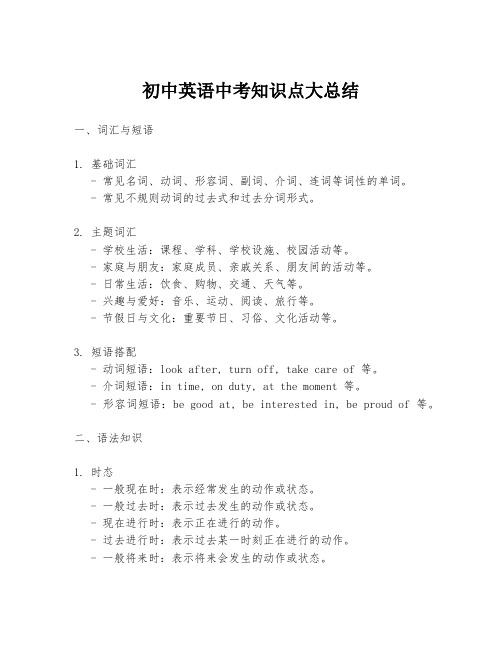
初中英语中考知识点大总结一、词汇与短语1. 基础词汇- 常见名词、动词、形容词、副词、介词、连词等词性的单词。
- 常见不规则动词的过去式和过去分词形式。
2. 主题词汇- 学校生活:课程、学科、学校设施、校园活动等。
- 家庭与朋友:家庭成员、亲戚关系、朋友间的活动等。
- 日常生活:饮食、购物、交通、天气等。
- 兴趣与爱好:音乐、运动、阅读、旅行等。
- 节假日与文化:重要节日、习俗、文化活动等。
3. 短语搭配- 动词短语:look after, turn off, take care of 等。
- 介词短语:in time, on duty, at the moment 等。
- 形容词短语:be good at, be interested in, be proud of 等。
二、语法知识1. 时态- 一般现在时:表示经常发生的动作或状态。
- 一般过去时:表示过去发生的动作或状态。
- 现在进行时:表示正在进行的动作。
- 过去进行时:表示过去某一时刻正在进行的动作。
- 一般将来时:表示将来会发生的动作或状态。
2. 语态- 被动语态:表示动作的承受者。
- 常见时态的被动语态形式。
3. 非谓语动词- 动名词:作为名词使用,表示动作。
- 分词:现在分词和过去分词,用作形容词或副词。
- 不定式:作为名词、形容词、副词等。
4. 情态动词- can/could, may/might, must, should/ought to 等。
- 表示可能性、建议、义务等。
5. 代词- 人称代词、物主代词、反身代词、指示代词、疑问代词等。
6. 连词- 并列连词:and, but, or, so 等。
- 从属连词:because, since, although, if, when 等。
7. 句子结构- 简单句、复合句、复杂句。
- 陈述句、疑问句、祈使句、感叹句。
8. 特殊句式- 倒装句:表示强调或条件。
- 省略句:在某些情况下可以省略句子的某些成分。
中考英语重点知识归纳
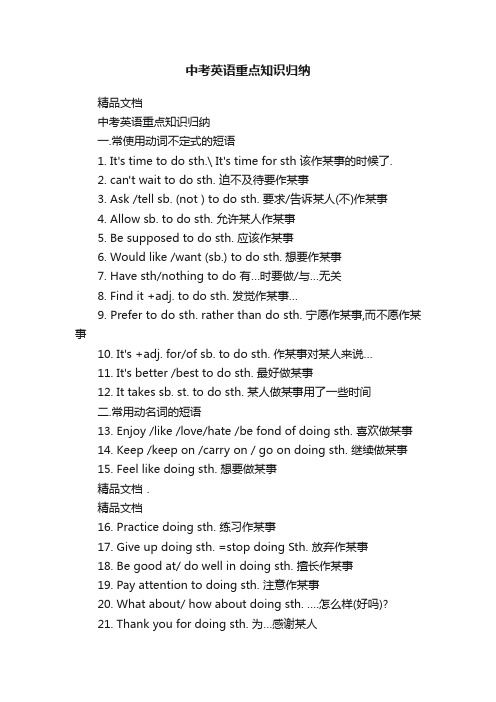
中考英语重点知识归纳精品文档中考英语重点知识归纳一.常使用动词不定式的短语1. It's time to do sth.\ It's time for sth 该作某事的时候了.2. can't wait to do sth. 迫不及待要作某事3. Ask /tell sb. (not ) to do sth. 要求/告诉某人(不)作某事4. Allow sb. to do sth. 允许某人作某事5. Be supposed to do sth. 应该作某事6. Would like /want (sb.) to do sth. 想要作某事7. Have sth/nothing to do 有…时要做/与…无关8. Find it +adj. to do sth. 发觉作某事…9. Prefer to do sth. rather than do sth. 宁愿作某事,而不愿作某事10. It's +adj. for/of sb. to do sth. 作某事对某人来说…11. It's better /best to do sth. 最好做某事12. It takes sb. st. to do sth. 某人做某事用了一些时间二.常用动名词的短语13. Enjoy /like /love/hate /be fond of doing sth. 喜欢做某事14. Keep /keep on /carry on / go on doing sth. 继续做某事15. Feel like doing sth. 想要做某事精品文档.精品文档16. Practice doing sth. 练习作某事17. Give up doing sth. =stop doing Sth. 放弃作某事18. Be good at/ do well in doing sth. 擅长作某事19. Pay attention to doing sth. 注意作某事20. What about/ how about doing sth. ….怎么样(好吗)?21. Thank you for doing sth. 为…感谢某人22. Mind doing sth. 介意作某事23. Be used for doing sth./ be used to do sth. 被用来作某事24. Spend …(in) doing sth. 花时间作某时25. Be busy doing/ with sth. 忙于作某事26. Finish doing sth. 作完某时27. Make a contribution to doing sth. 在…做贡献28. Look forward to doing Sth.29. Prefer doing sth. to doing sth. 喜欢…胜过…30. Be/get used to doing sth. 习惯作某事31. Keep / stop/ prevent sb. from doing sth. 阻止某人作某事32. have problems/ difficulty (in) doing sth.做某事有….麻烦三.省略动词不定式的短语33. 一感二听三使役四看半帮助34. See/ hear/ feel/ notice/ look at /listen to sb. do sth.看见/听见/感觉/注意某人作某事精品文档.精品文档35. Make /let /have sb. do sth. 使/让某人做某事36. Help sb. (to) do sth/ with sth. 帮助某人作某事37. Had better (not) to sth. 最好(不)做某事38. Why don't you/ not do sth. 为什么不作某事39. Would /Will / Could you please (not) do sth.请你(不)作某事好吗?四、同(近)义词比较40. Stop to do sth. 停下来正在做的事去作另一件事Stop doing sth. 停止正在作的事Eg. When the teacher came into the classroom, the students stopped talking. After he worked for an hour, he stopped to have a rest./记得要去作某事41. Forget / remember to do sth. 忘记忘记记得曾经做过某事Forget / remember doing sth.Eg. Please remember to bring my book to school.I remember doing my homework过去常常作某事used to do sth. 42.被用来作某事be used to do sth.习惯于作某事be used to doing sth.eg. My father used to smoking.Wood is used to make paper.I am used to getting up early.精品文档.精品文档43. . So +be/助动词/情态动词+ 主语…也一样So +主语+be/助动词/ 情态动词是呀,表示赞同别人的观点Nor/Neither + be /助动词/ 情态动词+主语…也不一样(用于否定句)Eg. He has been to Beijing. So have I.i. It's a fine day. So it is.ii. She doesn't like eggs. Neither do I.44. too+adj. /adv…to do sth. 太…而不能…i. so +adj. /adv + that(从句) 如此…以致…ii. such +(a/an +adj.)+n.+ that(从句) 如此…以致…iii. (not) enough (for sb.) to do sth. (对某人来说)做某事(不)够Eg. The boy is too young to go to school.iv. The boy is so young that he can't go to school.v. He is such a young boy that he can't go to school.vi. The boy is not old to go to school.五、常考知识点45. keep +adj. 保持…状态keep (sb.) doing sth. 继续做某事/使某人老是做某事eg. Everyone should keep our classroom clean.i. It's too late, but he still keeps working.ii. Lily always keeps us waiting for her.精品文档.精品文档46. make + n. 使某人成为a) make + sb. + adj. 使某人…b) make sb. do sth. 使某人做某事c) Sb. be made to sth. 某人被迫做某事Eg. We made Peter our monitor.i. Books make us happy.ii. He often makes me laugh.iii. The workers were made to work 12 hours a day.47. I don't think that 我认为…不Eg. I don't think you are right,are you?48. It's /has been+ some time +since+一般过去时…自从…以来有多久了Eg. It has been two years since we met last time.49. What do you mean by/ What does .. mean? 是什么意思?Eg. What do you mean by “computer”?/What does “computer”mean?50. What do you think of…/How do you like …? 你认为…怎么样?Eg. What do you think of this film /How do you like this film?51. What is/was/will …be li ke? ..怎么样?Eg. What is the weather like?What will the life in the future be like?52. It's said/ reported that…据说/据报道Eg. It's said that the population of the word would be 6 billion in 2o5o.53. one of the 形容词最高级+名词复数…其中之一精品文档.精品文档Eg. Shanghai is one of the biggest cities in China.54. Neither…nor…既不…也不(两者都不)i. either or…要么…要么/或者…或者/不是…就是ii. not only…but also…不但…而且iii. 以上三个词做主语时,要用就近原则Eg. Neither you nor he has been to the USA.iv. Either he or you go to the park.v. Not only my mother but also my father is a teacher.55. 比较级+ than +any other +名词单数…比其余任何一个…比较级+ than + the other+名词复数Eg. Shanghai is bigger than any other city/the other cities in China.56. When(当…的时候), if (如果), as soon as(一…就), until(直到…才), unless(除非/如果…不)这几个词引导的时间或条件状语从句时,主句要用一般将来时.Eg. I will call you when he comes.i. If it doesn't rain tomorrow, we will have a picnic.ii. As soon as I get to Beijing, I'll come to see you.iii. He won't go to bed until his parents come back.iv. Unless you work hard, you won't catch up with others.六.常用句型间的转换57.Something is wrong with...?/There is something wrong with/Sth. doesn't work/Sth. is broken.57. It's time to do…./It's time for sth.精品文档.精品文档58. Let's do sth. shall we?//Shall we do sth?/What about doing sth?/Why not do sth.?59. Why don't you do sth.?/Why not do sth?61. How is the weather?/What's the weather like?61. How do you like…?/What do you think of…?62. Turn left(right) at the second crossing./Take the second turning on the right/left.63. Sth. cost(s) sb. money./Sb pay(s) money for sth./Sb spend(s) money buying/on sth.64. Can you tell me the to…?/Which is the way to…?/Can you tell me how to get to…?65. look after well/takegood care of..; have a good time /enjoy oneself/have fun doing;give sb a call(ring)/ring up/make a telephone call; all by oneself/alone;miss/not catch;fall asleep/get to sleep;be different from/not the same;send for/ask sb to come;be good at/do well in;hear from/get(receive,have) a letter from;66…..after(when)/not…until……66. like….better than…./prefer to do…..67. when ….years old/….at the age of…68. so…that sb can't /couldn't/too…for sb to do/not….enough for sb to do …69. 主语+谓语+宾语从句/主语+谓语+疑问词+to do.。
初中英语重点知识点总结(中考必备)

初中英语重点知识总结(短语及语法结构)知识点归纳(一)1 、see,hear,notice,find,feel,listen to,look at (感官动词)+ do eg: I like watching monkeys jump.2 、(比较级and 比较级) 表示越来越……3 、a piece of cake =easy 小菜一碟(容易) 补:a place of interest 名胜4 、agree with sb. 赞成某人5、all kinds of 各种各样a kind of 一种/样6 、all over the world = the whole world 整个世界7、along with 同……一道,伴随…… eg : I will go along with you 我将和你一起去The students planted trees along with their teachers. 学生同老师们一起种树。
8 、As soon as 一……就……9、as you can see 你是知道的10、ask for ……求助向……要……(直接接想要的东西) eg: ask you for my book11 、ask sb. for sth. 向某人什么12 、ask sb. to do sth. 询问某人某事ask sb. not to do sth. 叫某人不要做某事13 、at the age of 在……岁时eg:I am sixteen. I am at the age of sixteen.14、at the beginning of … ……的起初;……的开始15、at the end of +地点/+时间最后;尽头;末尾eg : At the end of the day16、at this time of year 在每年的这个时候补:at least 至少17、be /feel confident of sth. /that clause + 从句感觉/对什么有信心,自信eg:I am / feel confident of my spoken English I feel that I can pass the test18、be + doing 表:1 现在进行时2 将来时19、be able to (+ v.原) = can (+ v.原) 能够……eg: She is able to sing. She can sing. 补:base on 以……(为)根据20 、be able to do sth. 能够干什么eg: She is able to sing.21 、be afraid to do (of sth. 恐惧,害怕……eg: I'm afraed to go out at night. I'm afraid of dog.22 、be allowed to do 被允许做什么eg: I'm allowed to watch TV. 我被允许看电视。
初中英语重点知识点总结(中考必备)

初中英语重点知识总结(短语及语法结构)知识点归纳(一)1 、see,hear,notice,find,feel,listen to,look at (感官动词)+ do eg: I like watching monkeys jump.2 、(比较级and 比较级) 表示越来越……3 、a piece of cake =easy 小菜一碟(容易) 补:a place of interest 名胜4 、agree with sb. 赞成某人5、all kinds of 各种各样a kind of 一种/样6 、all over the world = the whole world 整个世界7、along with 同……一道,伴随…… eg : I will go along with you 我将和你一起去The students planted trees along with their teachers. 学生同老师们一起种树。
8 、As soon as 一……就……9、as you can see 你是知道的10、ask for ……求助向……要……(直接接想要的东西) eg: ask you for my book11 、ask sb. for sth. 向某人什么12 、ask sb. to do sth. 询问某人某事ask sb. not to do sth. 叫某人不要做某事13 、at the age of 在……岁时eg:I am sixteen. I am at the age of sixteen.14、at the beginning of … ……的起初;……的开始15、at the end of +地点/+时间最后;尽头;末尾eg : At the end of the day16、at this time of year 在每年的这个时候补:at least 至少17、be /feel confident of sth. /that clause + 从句感觉/对什么有信心,自信eg:I am / feel confident of my spoken English I feel that I can pass the test18、be + doing 表:1 现在进行时2 将来时19、be able to (+ v.原) = can (+ v.原) 能够……eg: She is able to sing. She can sing. 补:base on 以……(为)根据20 、be able to do sth. 能够干什么eg: She is able to sing.21 、be afraid to do (of sth. 恐惧,害怕……eg: I'm afraed to go out at night. I'm afraid of dog.22 、be allowed to do 被允许做什么eg: I'm allowed to watch TV. 我被允许看电视。
- 1、下载文档前请自行甄别文档内容的完整性,平台不提供额外的编辑、内容补充、找答案等附加服务。
- 2、"仅部分预览"的文档,不可在线预览部分如存在完整性等问题,可反馈申请退款(可完整预览的文档不适用该条件!)。
- 3、如文档侵犯您的权益,请联系客服反馈,我们会尽快为您处理(人工客服工作时间:9:00-18:30)。
初中英语知识归纳总结第一课时名词一、概述1、名词的属性:表示人或事物的名称抽象概念的词叫名词。
2、名词分普通名词和专有名词。
普通名词是表示某一类人或事物,或某种物体或抽象概念的名称。
如:teacher, desks, plates, milk, box等,专有名词表示某一特定的人、事物、地方团体、党派、国家机关、语言、节日等专用的名称。
(运用)如:China, Chinese, Saturday, June, Green, Beijing, Olympic等。
(专有名词的第一个字母要大写)二、可数名词与不可数名词1、可数名词是指表示人或事物,可以用数来计量的名词,有单复数之分。
如:glass-----glasses; book---- books2、不可数名词是指所表示的事物不能用数来计量。
如:paper, rice, water , milk, tea等。
3、有些名词在特定情况下由不可数变为可数名词。
Light travels faster than sound; (light:光线,不可数)The lights are on.(light:灯,可数)4、不可数名词的量的表示不可数名词一般无法用数来计算,前面不能用a或an或数词来表示数量,它的量往往借助于容器来表示。
如:a glass of milk ------four glasses of milka piece of paper------two pieces of papera bag of rice------three bags of rice三、可数名词的复数形式(识记、运用)1、可数名词在应用时有单复数之分,单数变复数有规则变化和不规则变化两种。
规则变化2、policeman---policemen; man---men; woman---women;tooth---teeth; foot---feet; sheep---sheep; deer---deer;Japanese--- Japanese; Chinese --- Chinese; fish --- fish四、名词所有格(运用)名词的所有格是表示所有关系的形式,它也有构成上的变化。
1、单数名词变所有格,只需在词尾加’ s;2、复数名词的词尾已有s,只需加’ 即可;3、复数名词的词尾若没有s ,则应加’ s ;4、如果表示某人或物为两人所共有,则在第二个人后面加’ s ;如:Da Mao and Xiao Mao’s room如果不是两人共有,则在每个人后面都加’ s;如:Li Lei’s and Tom’s mother5、名词所有格结构通常用于表示有生命的名词,或表示时间、距离、地点等,而表示无生命名词的所有关系则用“of”表示。
如: the windows of house the picture of the familyof 结构也能用于有生命名词的所有格。
a friend of my sister’s a book of his第二课时冠词(一)一、概述冠词是一种虚词,在句子中不重读,本身不能独立使用。
在汉语中没有这个词类。
在学习冠词时,要注意这种加在名词前帮助说明名词所指的人或事物的词表示数量“一”时,与数词的区别;其表示“数量”的意义没有“one”强,这是学习中注意区别的。
二、冠词的定义冠词是置于名词之前,说明名词所表示的人或事物的一种虚词,它不能离开名词而单独存在。
冠词有两种:一种是定冠词(the Definite Article);the一种是不定冠词(the Indefinite Article). a an三、不定冠词的用法a用于辅音音素起首的单词前,an用于元音音素起首的单词前。
1、当第一次提到某人或某物时,用a或an起介绍作用,如:What is this? It is a bus.Who is she?She is a doctor.2、表示泛指一类人或物A snake is a cold-blood animal.A plane is a machine that can fly.3、表示某一类人或事物的任何一个。
如:She is a teacher;That is an apple.There is an elephant in the zoo.4、可用于某些词组,是该词组不可缺少的组成部分。
如:a long time a little a fewat a time have a try take a chance5、表示“每一个”的意思。
如:three times a day four yuan a dozen6、可用于抽象名词之前,使抽象名词具体化。
如:I am quite at a loss;The little child is a joy to his parents.7、用于物质名词之前,使物质名词普通化。
如:He drew out a tin of pineapple.They made a fire to get warm.注意:1、不定冠词an用在以元音(不是字母,而是发音)起首的名词或其他以元音起首的词之前,不定冠词a用在以辅音起首的名词或其他以辅音起首的词之前。
2、u和h有时在单词中发元音,有时却读作辅音或不发音。
如:I have been waiting for an hour.He is an honest young fellow.A hammer is a useful fool.3、英语中有些字母,如f h l m n s x。
由于它前头第一个音是元音,所以在单独使用或作缩略词的第一个字母时,应使用“an”,如:There is an “n” in the word “no”.An MP means a member of parliament.第三课时冠词(二)一、定冠词的用法定冠词the 有this, that, these, those等意思,用于单数或复数名词前。
主要用来特指,使一个或几个事物区别于所有其他同名的事物。
1、指前文已经提到过的人或事物。
如:I wrote an article. The article was about physics.2、指说话人都知道的人或事物。
如:Please close the door before you leave. Let’s go to the classroom.3、名词有定语修饰时,须用定冠词the,表示特指意义。
如:The book on the desk is his.The teacher who talked with you is her mother.4、用于世界上独一无二的事物前。
如:the sun the moon the earth the sky the world5、用在序数词前面表示顺序。
如:I live on the fourth floor. My mother is always the first one to come and the last one to leave.6、与其他词连用,构成固定词组。
如:on the left in the north in the front of7、在表示乐器名称的名词之前用定冠词。
如:the piano the violin8、用在形容词或副词的最高级前面。
如:This was the most interesting voyage we had ever had. He is the tallest of us.9、用在形容词前面,表示复数意义的某一类人或事物。
如:the rich the poor the young the living the new the right the true the beautiful10、在表示江河、山脉、海湾、海峡、沙漠等专用名词之前加定冠词。
如:the Changjiang River the Nile the Alps the Himalayas11、用在年代、朝代、时代名词前。
如:the Qin Dynasty the Ming Dynasty in the 50’s the spring period12、和表示姓氏名词的复数形式连用,表示某姓氏一家人或夫妇二人。
如:the Lis the Martins二、不用冠词的情况1、除一些特殊情况外,专用名词以及抽象名词和物质名词前不加冠词。
如:Man is mortal. Miss Smith came in power at last.2、当名词前已有this, that, my, his, any, every, some, no, those, these等词修饰时或有所有格修饰时,不必加冠词。
如:She is my sister. This article you had written is very wonderful.3、在交通工具、学科名称等名词前不加冠词。
如:by plane by boat Chinese Physics4、在节日、假日、星期、月份、季节等名词前不加冠词。
如:National Day May Day Autumn January5、在一日三餐、体育类等名词前不加冠词。
如:He prefers milk and egg for breakfast. He preferred to play football and I’d rather play tennis.6、在唯一的职务、头衔的名词前不加冠词。
如:He is elected manager of our company. People elected him president of that country last year.7、在报纸标题、图像说明、文章题目、标志、广告前不加冠词。
如:Worker’s Mind Notes on the Study of Hong Lou Meng8、在一些固定词组中不加冠词。
如:at home by mistake learn by heartat first at last at onceby sea day and night第四课时代词(一)一、概述代词是用来代替名词或名词短语的词。
代词的分类:人称代词:表示“我”、“我们”、“你”“你们”、“他、她、它”、“他们”的词叫人称代词; 物主代词:表示所有关系的代词,分为形容词性物主代词和名词性物主代词; 反身代词:表示动作反射到执行者本身或用来加强语气的代词; 指示代词:表示能替代名词或替代形容词的词; 不定代词:表示不指明替代任何特定名词的代词。
